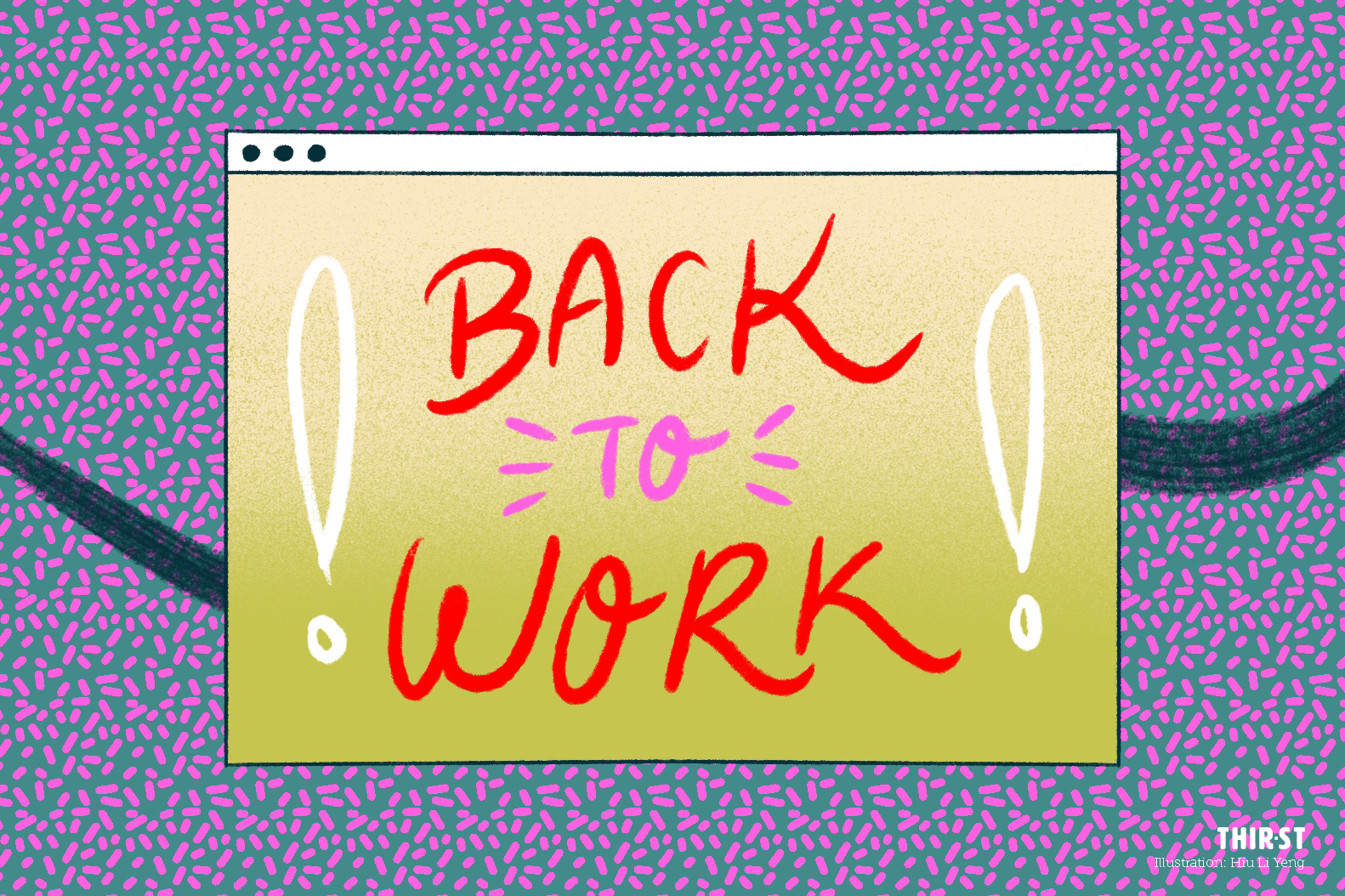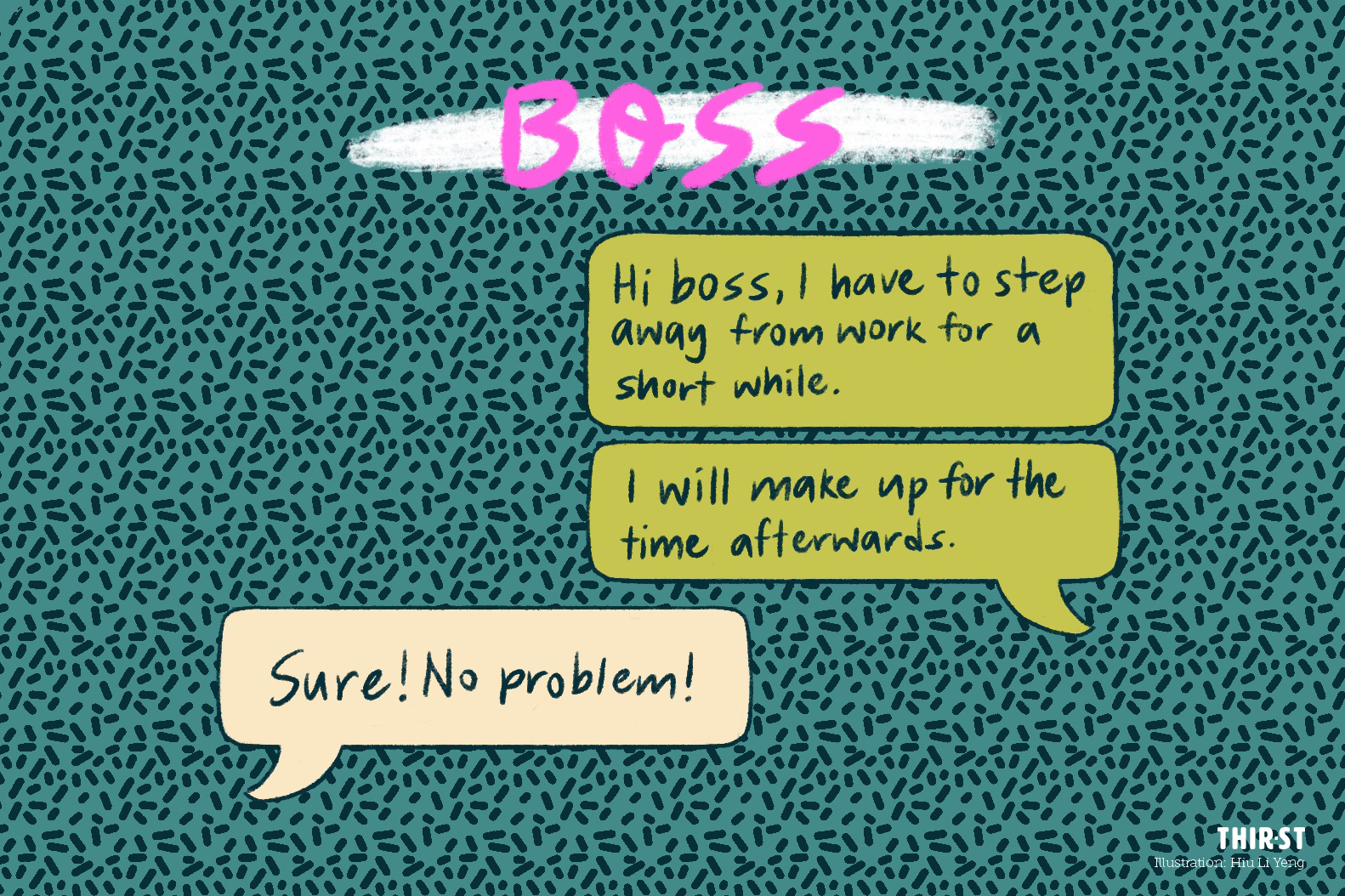It has been about 241 days since I’ve started working from home.
I don’t know about you, but I started off pretty determined and motivated. I would wake up at 8am and be fresh and ready for work at 9am.
I was less distracted and more productive, so much so that I started working through the night. I was working like a machine, but quite a happy one.
Then things started to plateau and go downhill. Work became home, and home became work. To make matters worse, we soon entered the circuit breaker and were all confined to work home.
The shine of working from home started to wear off.
The desk set-up that I enthusiastically put together lost its novelty. Even my chair started to feel uncomfortable. Afternoons were blending into evenings, and weekdays into weekends. Taking leave didn’t make sense either because we were still stuck in the same space that was now our home, office and everything else.
But just last week (September 23), the authorities announced that employees can now return to offices for up to half of their total working time. Some rejoice, while others have been dreading this moment.

A straw poll on The Straits Times‘ Telegram channel showed that almost 80% of respondents didn’t welcome the move to return to their workplaces. Maybe people have gotten too used to “working from home”.
Just the other day, I overheard a young man tell his friend: “Nowadays don’t need to take leave one – you leave your house nobody will know also!”
They chortled at that fact, and I knew there was some truth in that statement.
In another conversation with a friend, she told me that her colleagues were mostly uncontactable throughout the day, and even found evidence of them doing other things but work on Instagram Stories.
How does work ethic look like these days? Is there a way we can work with a clear conscience, no matter where we are? How do we find stability in the midst of a constantly changing work life?
Bearing in mind that more than half of our working time will still be spent at home, allow me to share a few things that I’ve found to be helpful.
CREATE YOUR OWN ROUTINES & BOUNDARIES
What used to be productive work days are now punctuated with these unexpected distractions.
You’re in a completely different environment – one that you might be too comfortable with. The bed is within reach, and you’re now surrounded by new co-workers – your family (and pets). Some of you might also have to take on extra roles as your parents’ caregiver or your family’s errand-runner.
Perhaps you’ve fallen into the trap of “doomscrolling” – the act of mindlessly scrolling through an unending refreshed feed of news, videos and other online content. Or can’t quite get rid of the itch to go online shopping that lurks at the back of your mind.
As we try to imitate and replicate life in the office that we’ve left behind, it’s also important to set clear boundaries – and uphold them.
Personally, I make sure I work under natural daylight, so I take the sunset as a cue to wrap up my work for the day. Once I’m done with work, I switch off my work laptop and use my personal computer if need be – just to break the habit of checking on work in the middle of the night.
However, some of us who struggled with unwelcomed distractions or spent time meeting the needs of the family during the day might have to put in more hours to get work done.
How much is enough for a day? How many more hours? Where do we draw the line? It’s like ditching your shadow – you will have to decide on that for yourself, based on integrity.
SHOW THAT YOU CAN BE TRUSTED
Months of working from home has taught me the importance of over-communication.
If you need to go somewhere, I would strongly suggest that you keep your team in the loop. On one occasion, my family realised we ran out of rice right before lunch. This might sound like a non-issue, but I felt that it was only right for me to check if it was okay for me to leave my desk for a bit and dash to the supermarket.
Of course, I made sure to make up for the time thereafter.

With our bosses and co-workers having little or no visibility on our day’s activities, it helps to maintain and cultivate team rapport if we make more effort in communicating – even if it means having to repeat ourselves at times.
Accountability breeds trust. Remember that for bosses who have long struggled to trust their employees, this is a test for them as well. Trust has never been more important. Help them to trust you.
If you have pressing concerns or are facing issues with your work arrangements, let your employers know – politely. And be proactive in replying to messages. Show each other that you’re still there!
HELP YOUR FAMILY TO HELP YOU
Likewise, if you are going to need uninterrupted hours at home, let your family know. I learnt this the hard way when my Zoom meetings coincided with meal times at home.
My mum’s the kind of person who prefers to be given a detailed rundown of tomorrow’s plans. And when it completely didn’t occur to me that I should let her know in advance about my meetings, we found ourselves in extremely tense and unhappy situations resulting from the stress of accommodating to the sudden change in routine.
Stress from family tensions in this time can distract us from being fully present at work in the day. Maybe you have parents who are sick and need your assistance. Maybe you have parents who are also working at home and need someone to help share the household chores.
How can we help to offload one another’s burdens at home? Perhaps just being more intentional in communication (as with our bosses) can make a big difference.
Remember, we’re not the only ones adapting to new routines. Our families are also finding their own pace and momentum in this new normal as well.
THE STRUGGLE IS REAL
Are you going through a slump right now, brought on by the fatigue of working from home? Have you lost the motivation to be productive? Does work no longer excite you anymore?
Or are you struggling with the thought of returning to office?
As I’m writing this, I’ve returned to working in office two days a week. I would be lying if I said it wasn’t hard.
I haven’t woken up this early or ran for the bus in a long time. Wearing a mask for the entire day makes me slightly light-headed… don’t even get me started on the acne problems.
But it’s not that bad either. It’s great to see my colleagues again, this time in person and no longer through a computer screen over laggy Wi-Fi connection and low-quality audio.
There’s a new excitement about work that’s not quite the same as before and a new synergy in the office, probably ignited from the joy of our reunion.

Some of you may be returning to your offices in the coming weeks, while some of you continue to remain at home.
For those of us who are Christians, it’s time to ask ourselves this: What does it mean to work for Jesus?
“Whatever you do, work at it with all your heart, as working for the Lord, not for human masters, since you know that you will receive an inheritance from the Lord as a reward. It is the Lord Christ you are serving.” (Colossians 3:23-24)
Whether we’re working 9am-6pm in the office or irregular hours at home, we need to remember the greater purpose behind our work. As we submit to our employers and commit to the work we’re assigned, God is looking at our heart.
So let’s put ourselves fully into our tasks instead of working half-heartedly. When we work, we work hard. If God has appointed us to be employed in this season, we cannot abandon post. Our work honours God.
As we approach yet another new normal, let’s choose discipline over idleness, and integrity over indolence.
- What are your biggest challenges of working from home?
- Are you honouring God with the way you’re working?
- What does it mean to work with integrity and a clear conscience? Are there any changes you’ll need to make to your lifestyle?









